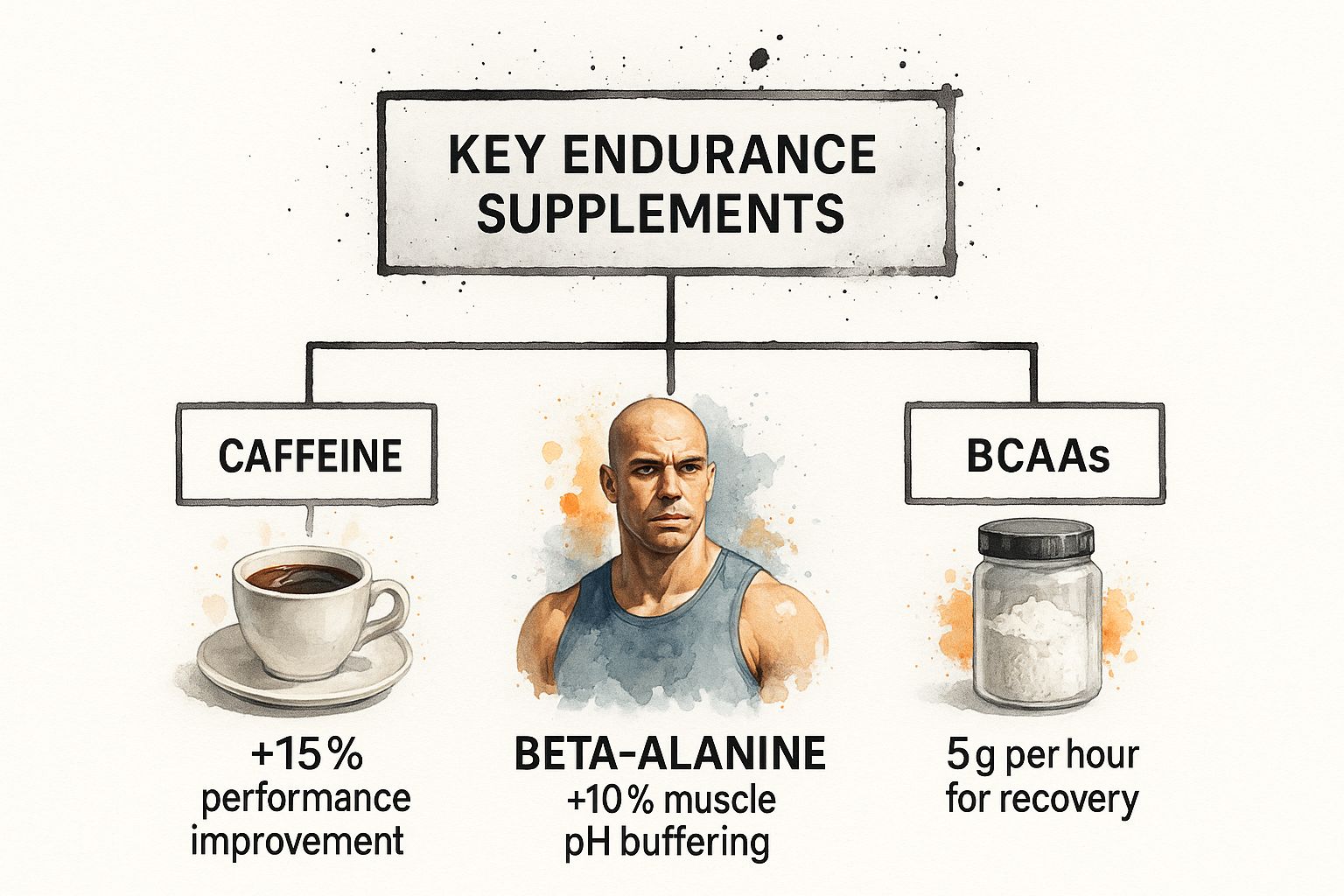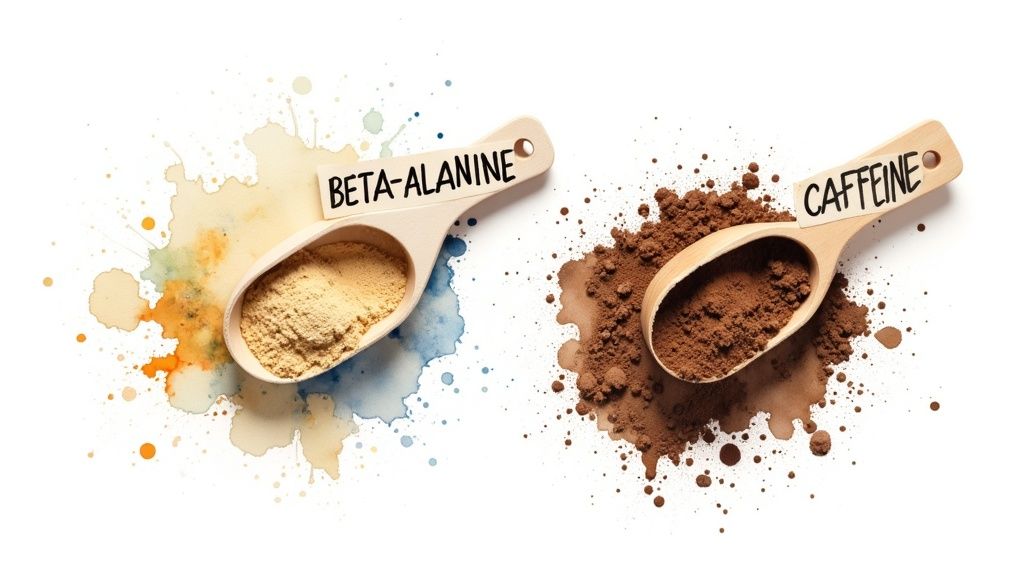When you think of the best supplements for endurance, things like carb gels and a strong coffee probably spring to mind. And they have their place, for sure. But true, lasting endurance isn't just about what gets you through the next race. It's about building a body that performs consistently, year after year, for a lifetime.
Why Endurance Supplements Are Key to Longevity

It’s all too easy to focus solely on immediate performance—shaving seconds off your PB, extending your long run, or pushing harder on the bike. But a smarter, more sustainable viewpoint connects today's performance with tomorrow's health. Longevity in sport isn’t just about slowing down decline; it’s about actively building a resilient body that can handle the wear and tear of intense training for decades.
This is where strategic supplementation comes into its own, moving beyond a simple performance kick. Instead of just giving you a temporary lift, the right supplements work at a cellular level to support your long-term vitality.
The Link Between Performance and Healthspan
Picture your body as a high-performance engine. When you push it hard, it creates exhaust fumes in the form of oxidative stress and inflammation. A little bit of this stress is actually good—it's what tells your body to adapt and get stronger. But chronic, unmanaged stress is a different story. It accelerates the ageing process and dials up your injury risk. This is the crucial intersection where endurance meets longevity.
The most effective supplements help you manage this delicate balance. They aren't magic pills, but smart tools that support your body’s natural processes. Key benefits include:
- Faster Recovery: Topping up essential nutrients helps repair muscle damage more efficiently, meaning you can train more consistently.
- Reduced Oxidative Stress: Antioxidant compounds step in to neutralise harmful free radicals produced during intense exercise, protecting your cells from damage.
- Enhanced Cellular Energy: Certain supplements boost mitochondrial function—the tiny powerhouses inside your cells—making your energy production far more efficient.
- Sustained Training Capacity: By keeping fatigue at bay and speeding up recovery, you can train effectively for years, not just for a single season.
This forward-thinking approach is clearly catching on. The UK sports nutrition market, valued at approximately USD 1.08 billion in 2025, is expected to surge to nearly USD 2.5 billion by 2035. This growth is fuelled by athletes like you seeking out personalised and effective products. You can explore more data on the UK sports nutrition market to see the trends for yourself.
True athletic longevity is achieved when your recovery and cellular support systems are as well-trained as your muscles. Supplements are a key part of that system, helping to fortify your body from the inside out.
Ultimately, choosing the right supplements is an investment in your future self. It’s about making sure the activities you love today don't take a toll on your health tomorrow, allowing you to stay active, competitive, and vibrant for life.
Top Endurance & Longevity Supplements at a Glance
To give you a clearer picture, here's a quick rundown of some of the most effective supplements that bridge the gap between immediate endurance gains and long-term health.
| Supplement | Primary Endurance Benefit | Longevity Connection |
|---|---|---|
| Creatine | Boosts short-burst power & delays fatigue | Supports muscle mass retention & cognitive function with age |
| Coenzyme Q10 (CoQ10) | Enhances cellular energy (ATP) production | Acts as a powerful antioxidant, protecting cells from oxidative damage |
| Nitrate (from Beetroot) | Improves blood flow & oxygen efficiency | Supports cardiovascular health by promoting healthy blood pressure |
| Omega-3 Fatty Acids | Reduces exercise-induced inflammation | Fights chronic inflammation, a key driver of age-related disease |
This table highlights how the smartest choices do double duty—they help you perform better now while simultaneously laying the groundwork for a healthier, more active future.
Building Your Foundational Supplement Stack
Before you start chasing the latest and greatest performance enhancers, you need to get the basics right. Think of it like building a house – you wouldn't put the roof on before you've laid a solid foundation. For an endurance athlete, that foundation is a core set of nutrients that your body absolutely relies on to handle the stress of consistent training. These are the non-negotiables for energy, hydration, and recovery.
Get these fundamentals sorted, and you're setting yourself up for real, long-term athletic health. Without them, even the most advanced supplements will fall flat. This isn't about finding a magic bullet for race day; it's about building a resilient body that can perform well, day in and day out, for years to come.
This chart gives you a quick look at how even some basic, well-proven supplements can deliver significant gains.

As you can see, we're not talking about marginal improvements here. From a caffeine kick to beta-alanine's ability to fight off muscle burn, getting your foundation right pays off.
Carbohydrates: Your High-Efficiency Fuel Source
Let's be clear: carbohydrates are the undisputed king of endurance fuel. There's no debate. Your body breaks them down into glycogen, which it then stores in your muscles and liver. During exercise, that glycogen is your go-to energy source, powering everything from a steady long run to that final, all-out sprint for the finish line.
Trying to train without enough carbohydrates is like setting off on a long road trip with a quarter tank of petrol. Sure, you'll get started, but you won't get very far before you start to sputter and grind to a halt. For any endurance athlete, keeping those glycogen stores topped up is the key to avoiding the dreaded "bonk" or "hitting the wall."
And this isn't just about carb-loading the night before a race. A consistent intake of quality carbs throughout your training week ensures your energy stores are always ready for the next hard session, which in turn leads to better performance and faster recovery. This is crucial for longevity, too. When you’re properly fuelled, you reduce the overall stress on your body and avoid slipping into a catabolic state where it starts breaking down muscle for energy.
Electrolytes: The Body's Electrical Wiring
If carbs are the fuel, then electrolytes are the spark plugs. These essential minerals – we're talking mainly about sodium, potassium, magnesium, and calcium – are what allow nerve signals to fire and muscles to contract. They're the electrical wiring of your entire system.
When you sweat, you're losing a lot more than just water. You're pouring out these vital minerals. Let that imbalance get too severe, and a whole host of performance-killing problems start to crop up:
- Muscle Cramping: Usually the first, and most painful, sign that you're running low.
- Reduced Performance: Your muscles just can't contract with the same force, leaving you feeling weak and fatigued.
- Mental Fog: As nerve impulses slow down, your focus and coordination take a hit.
Just chugging plain water during a long or intense workout often isn't enough. In fact, without electrolytes to help pull that fluid into your cells, you can sometimes make the imbalance even worse.
Replenishing electrolytes is a non-negotiable part of endurance nutrition, especially when it's hot. An electrolyte powder or tab in your bottle ensures your muscular and nervous systems keep firing on all cylinders. This not only prevents immediate issues like cramping but also supports your long-term cardiovascular health by helping your body maintain a stable fluid balance under stress.
Omega-3s: The Master Regulators of Inflammation
Hard training is, by its very nature, an inflammatory process. A little bit of acute inflammation is actually a good thing – it's part of how your body adapts and gets stronger. The problem is chronic, unchecked inflammation, which is a one-way ticket to overtraining, injury, and a faster decline as we age. This is where omega-3 fatty acids, especially EPA and DHA, come into play.
Think of omega-3s as your body's built-in fire extinguishers. They are powerful anti-inflammatory agents that help dampen down the inflammatory response sparked by your training. By keeping that response in check, they can significantly reduce muscle soreness, speed up your recovery between sessions, and protect your joints from long-term wear and tear.
Getting enough omega-3s, whether from fatty fish or a high-quality supplement, helps put your body in a more resilient, anti-inflammatory state. This not only allows you to handle a bigger training load but also pays huge dividends for your longevity. By combating chronic inflammation, omega-3s support the health of your heart, brain, and entire vascular system for the long haul.
As you build this stack, remember that what you consume is only as good as what you can absorb. Gut health is fundamental to getting the most out of your supplements and food. You might want to look into some of the top gut health supplements to ensure your system is running efficiently.
Unlocking Peak Performance and Cellular Resilience

Once your daily nutrition is dialled in, you can start looking at supplements that offer a real competitive edge. These aren’t magic pills, but compounds that work on specific energy pathways to help you push harder, go for longer, and bounce back faster.
But the real secret isn't just about a short-term boost. It's where performance meets longevity. The supplements we'll cover here don't just give you a temporary lift; they strengthen your body at a cellular level, making you more resilient to the stress of hard training. This double-win is the key to not only reaching your peak but staying there for the long haul.
It's an approach that's gaining serious traction. In the UK alone, the dietary supplements market was valued at £4.79 billion in 2024, with a huge chunk dedicated to sports performance. With staples like creatine making up 73.3% of the over-the-counter market share, it’s obvious that athletes are actively seeking proven ways to support their energy and long-term health. You can discover more insights into the UK dietary supplements market to see just how this trend is shaping athletic nutrition.
Creatine: The Rapid Energy Recharger
Creatine is one of the most heavily researched supplements on the planet, and for good reason. It works. But many endurance athletes still wrongly assume it’s just for bodybuilders. While it’s famous for its role in the weights room, its benefits are far more widespread.
Think of the immediate energy in your muscles as a tiny, rechargeable battery called ATP (adenosine triphosphate). When you make a sudden, intense effort—like sprinting up a hill or kicking for the finish line—you drain that battery almost instantly. This is where creatine comes in. It acts like a rapid-charging power pack, donating a molecule that quickly rebuilds ATP, letting you sustain that high-intensity effort for just a bit longer.
For you, this means you can attack your interval sessions with more power and recover faster between reps, which ultimately drives better fitness adaptations over time.
What’s just as compelling is its link to longevity. Creatine also supports brain health and helps us hang on to precious muscle mass as we get older, both of which are cornerstones of a long and active life. By keeping your mind and muscles sharp, it’s a true dual-purpose supplement.
Beta-Alanine: Your Fatigue Buffer
You know that intense burning feeling in your muscles during a really hard push? The one that forces you to back off? That’s caused by a build-up of hydrogen ions, which makes your muscles more acidic. Beta-alanine is an amino acid that tackles this problem head-on.
It works by boosting your muscles’ supply of carnosine, a compound that acts as a "fatigue buffer". Carnosine essentially soaks up those acidic ions, helping to keep the pH level inside your muscle cells more stable.
By buffering this acid build-up, beta-alanine allows you to hold a higher intensity for longer. This could be the difference between staying with the lead group on a tough climb or getting dropped.
This improvement in muscular endurance leads directly to higher quality training and better race-day results. From a longevity standpoint, allowing your body to handle tougher workouts more efficiently reduces the overall physiological stress of each session. That means better recovery and a more sustainable training journey for years to come.
Nitrates: The Oxygen Efficiency Booster
What if you could make your body's engine more fuel-efficient? That's pretty much what dietary nitrates do. Found naturally in foods like beetroot, rocket, and spinach, nitrates are converted by the body into nitric oxide.
Nitric oxide is a potent vasodilator, which is a fancy way of saying it relaxes and widens your blood vessels. This has two brilliant benefits for any endurance athlete:
- Better Blood Flow: Wider blood vessels mean more oxygen-rich blood can get to your working muscles, right when they need it most.
- Greater Oxygen Efficiency: Nitric oxide also makes your mitochondria—the tiny powerhouses in your cells—more efficient. They learn to produce the same amount of energy while using less oxygen.
It's like getting better mileage out of your car. This improved efficiency means you can hold a certain pace at a lower physiological cost, which delays fatigue and saves energy for when you need it later in a race.
This mechanism also has a big impact on long-term health. By improving blood flow and reducing the oxygen cost of exercise, nitrates support your cardiovascular system and reduce the strain on your entire body, helping you train well and stay healthy for decades.
Exploring Next-Generation Longevity Enhancers
While the foundational supplements build your base and performance-focused ones sharpen your edge, a newer class of compounds is emerging. These sit at the fascinating crossroads of immediate performance and long-term health. We're talking about longevity enhancers—supplements designed not just to help you perform today, but to actively support your body's ability to thrive for decades to come.
This is a real shift in thinking. It moves us beyond simply managing fatigue and towards optimising the very systems that generate our energy and fight back against age-related decline. By going straight to the cellular level, the goal is to build a more robust, efficient, and resilient athletic body. It’s all about playing the long game, ensuring the hard work you put in now pays dividends well into your future.
CoQ10: The Cellular Spark Plug
Picture every cell in your body as having tiny power plants called mitochondria. These little engines are responsible for churning out ATP, which is the raw energy currency your muscles burn for every single movement. In this analogy, Coenzyme Q10 (CoQ10) is the master spark plug inside those power plants. Without it, the entire energy production line just grinds to a halt.
Unfortunately, our natural production of CoQ10 drops as we get older, which is a key reason many people experience a decline in energy and stamina. For an athlete, this is a double whammy. Lower CoQ10 means less efficient ATP production, and that translates directly to a lower aerobic capacity and feeling fatigued much quicker during long workouts.
Supplementing with CoQ10 is like recharging those cellular batteries. It helps ensure your mitochondria are firing on all cylinders, which can lead to tangible improvements in how your body uses oxygen and, ultimately, your overall endurance.
But this isn't just about a temporary boost. CoQ10 is also a potent antioxidant, working hard to protect your mitochondria from the oxidative stress that’s an inevitable byproduct of intense exercise. By shielding your cellular machinery from this damage, it supports healthier ageing and helps you maintain your performance potential for longer. You can explore how similar compounds support these pathways by digging into the science behind NMN and NAD+ booster capsules.
Adaptogens: Your Body's Stress Thermostat
We all know consistency is king in endurance training, but the constant physical and mental stress it creates can easily lead to burnout if you don't manage it. This is where adaptogens step in. Think of these unique plant-based compounds, like Ashwagandha and Rhodiola Rosea, as a sophisticated thermostat for your body's stress response.
They don't just artificially pump you up with energy or knock you out to calm you down. Instead, adaptogens help your body modulate its reaction to whatever stressors it's facing. When you’re feeling wiped out, they can help provide a lift. When you're feeling wired and over-stressed, they can help bring you back to a state of balance, or homeostasis.
This has huge implications for athletic longevity. By helping to regulate the primary stress hormone, cortisol, adaptogens can have several key benefits:
- Improve Recovery: Keeping chronic cortisol levels in check allows your body to more effectively switch into its "rest and repair" mode, speeding up muscle recovery.
- Enhance Mental Resilience: They can sharpen your focus and dial down that feeling of being overwhelmed that often comes with heavy training blocks.
- Prevent Burnout: By managing the cumulative toll of stress, they help you stay motivated and consistent over a long season—or even a whole career.
This ability to manage stress is what it's all about. It helps you avoid the downward spiral of overtraining and ensures your body can sustainably adapt to the demands you place on it. Beyond the common options, exploring things like ancient adaptogens can offer unique advantages for long-term health. By bringing these next-generation compounds into your routine, you're not just looking for the best supplements for endurance; you're making a serious investment in a longer, healthier, and more successful athletic journey.
How to Personalise Your Supplement Strategy

The most powerful supplement plan you’ll ever find won't be in a magazine or on a popular blog; it's the one designed specifically for you. To really move the needle on your performance and long-term athletic health, you have to shift away from generic advice and adopt a strategy driven by your own data. This is where you stop guessing and start knowing exactly what your body needs.
So, what's the ultimate tool for this kind of personalisation? Blood testing.
Think of it as looking under the bonnet of your car. It might seem to be running just fine, but a proper diagnostic check can spot underlying issues long before they become serious problems on the motorway. For an athlete, a blood test does precisely the same thing, uncovering hidden deficiencies that could be quietly holding you back.
This targeted approach means every supplement you take is safe, effective, and directly supporting your goals. You're no longer just throwing things at the wall to see what sticks; you're making precise, informed decisions that build a more resilient body for years to come.
Decoding Your Key Biomarkers
Blood testing gives you objective data about what’s happening on the inside, moving you beyond simply relying on how you "feel" on any given day. For endurance athletes, a few key biomarkers are particularly critical for both performance and longevity.
- Ferritin (Iron Stores): This isn't just about iron in your blood; it's a measure of your body's total iron reserves. Low ferritin, even without full-blown anaemia, can lead to persistent fatigue and slash your oxygen-carrying capacity, putting a serious cap on your endurance. It’s a really common issue for runners, and you can learn more about the signs and solutions in our guide to iron deficiency in runners.
- Vitamin D: Often called the "sunshine vitamin," this is crucial for bone health, immune function, and muscle recovery. Deficiencies are incredibly common, especially in the UK during the winter months, and can increase your risk of stress fractures and getting ill.
- hs-CRP (High-Sensitivity C-Reactive Protein): This is a sensitive marker for low-grade, systemic inflammation. If your levels are consistently high, it can be a sign that your body is struggling to cope with the stress of training, putting you at greater risk of overtraining and injury.
Understanding these markers provides truly actionable insights. You might finally discover that the fatigue you've been blaming on tough training sessions is actually a severe iron deficiency—a problem that no amount of caffeine is ever going to fix.
A personalised strategy is all about precision. It's the difference between blindly taking a multivitamin and knowing you need exactly 20mg of iron and 3,000 IU of Vitamin D to bring your levels into the optimal range for health and performance.
This shift toward data-driven nutrition is gaining huge momentum across the UK. With government initiatives like UK Active promoting sports nutrition, the European market is on track to hit USD 10.1 billion by 2032. This growth is being fuelled by athletes just like you, using personalised advice to enhance performance and sustain their physical endurance.
A Real-World Scenario
Let’s imagine a dedicated cyclist who feels constantly drained. Their performance has plateaued, and despite sleeping more, they just can't shake a deep-seated fatigue. They could guess, of course. They could start taking a random assortment of supplements, hoping one of them works.
Instead, they choose to get a blood test. The results come back showing their Vitamin D levels are fine, but their ferritin is critically low. The data is crystal clear: their body's iron stores are completely depleted.
Armed with this knowledge, their strategy becomes simple and direct. They work with a professional to start a targeted iron supplementation plan, paired with Vitamin C to improve absorption. Within a few weeks, their energy returns, their performance on the bike improves, and that persistent fatigue finally disappears.
This data-driven approach didn't just solve a short-term problem; it corrected a fundamental issue that was undermining their long-term health and athletic potential.
Frequently Asked Questions About Endurance Supplements
It's one thing to know what supplements to take, but understanding the how and why is what separates a good strategy from a great one. When you're pushing your body to its limits, you're bound to have questions. This section tackles some of the most common queries I hear from athletes, offering straight-up, evidence-based answers to help you build a plan that's not just effective, but safe and sustainable for the long haul.
The aim here isn't a quick fix. It’s about creating a strategy that supports your body for years, even decades, of training. Longevity in sport means making smart choices that protect your health while you’re chasing that next personal best.
How Long Until I See Results from These Supplements?
This is a classic question, and the answer depends entirely on how the supplement works. It’s best to think of them in two distinct categories: the fast-acting crew and the slow-burners.
- Acute Responders (Feel it Fast): Supplements like caffeine and nitrates (from beetroot juice) give you a near-immediate and very noticeable boost. You’ll feel their effects kick in within 30-90 minutes, which makes them perfect for race day or a particularly tough training session. They deliver a direct, short-term performance kick.
- Chronic Loaders (Builds Over Time): On the other hand, things like beta-alanine, creatine, and iron don't work instantly. They function by gradually building up stores in your body. This means you need to take them consistently, day in and day out, for several weeks to fully saturate your muscle tissues and unlock their real benefits.
A good analogy is this: caffeine is like hitting the nitrous button for a single lap, giving you a temporary surge. Creatine is more like upgrading the engine itself—it takes time, but it improves performance every single day you use it. Patience is the name of the game with these loaders.
Is It Possible to Get Everything from Food Alone?
A "food-first" philosophy should always be your starting point. You simply can't replicate the complex web of vitamins, minerals, and fibre found in whole foods with a pile of pills and powders. That said, the sheer physiological stress of serious endurance training creates nutritional demands that are incredibly difficult, sometimes impossible, to meet through diet alone.
Take iron, for instance. An athlete's iron needs can be up to 70% higher than a non-athlete's, thanks to things like foot-strike haemolysis (red blood cells breaking down from impact) and sweat loss. Trying to cover that deficit purely through food could mean eating an uncomfortably large amount of spinach or red meat every single day.
Supplements aren't a replacement for a great diet. Think of them as a strategic tool used to plug the specific nutritional gaps that intense training creates. They ensure your body gets exactly what it needs to perform and recover, right when it needs it.
This is especially true for the electrolytes you pour out in sweat during a long run or the specific amino acids your muscles are crying out for post-session. Supplements provide a targeted, efficient fix when food just can’t keep up.
Are Endurance Supplements Safe for Long-Term Use?
For the most part, yes. The foundational supplements we've talked about—like omega-3s, vitamin D, and electrolytes—are generally considered safe for continuous, long-term use. In fact, many people take them simply for general health and well-being, athlete or not. They support fundamental body processes that are always running.
The more performance-focused supplements, like beta-alanine or certain adaptogens, are often cycled. An athlete might use them during a demanding 12-week training block for a marathon, then take a break during the off-season. This approach can help maintain your body's sensitivity to the supplement and ensures you’re only using it during periods of peak physical demand.
Without a doubt, the single most important factor for long-term safety is quality assurance. Always, always choose supplements from reputable brands that use third-party testing services like Informed-Sport. This certification is your guarantee that the product is clean, free from banned substances, and contains what it says on the label. It protects both your health and your competitive integrity.
How Should I Combine Supplements for a Big Race?
Your race-day nutrition strategy is a skill that needs to be dialled in through practice, not guesswork. The golden rule is simple: nothing new on race day. Your gut thrives on routine, and springing a new gel, drink, or pill on it at the start line is a classic recipe for disaster.
Here’s a rough timeline for layering your supplements for peak performance:
- Weeks to Months Out: This is the time to focus on your "loaders." Be consistent with your creatine, beta-alanine, and any micronutrients that a blood test flagged as low, like iron or vitamin D. This is when you build your foundation.
- The Week Before: You might start a nitrate-loading protocol. This involves taking something like a beetroot shot for 3-5 days leading into the race to maximise your oxygen efficiency.
- Race Morning: Now it’s time for your acute supplements. Take your caffeine 30-60 minutes before the gun goes off. This ensures it peaks right when you need it most.
- During the Race: This is all about execution. Stick to the plan you’ve practised relentlessly, consuming your chosen carbohydrates and electrolytes at regular, rehearsed intervals.
By testing your entire nutrition and supplement plan during a long training run that mimics race-day intensity, you can stand on that start line with total confidence, knowing your body has everything it needs.
Ready to move from guesswork to precision? Lola offers comprehensive blood testing services that give you a clear, data-driven picture of what your body truly needs.
Our professional phlebotomists provide convenient at-home or in-clinic sample collection, and our UKAS-accredited labs deliver results you can trust. Stop wondering and start knowing. Optimise your performance and protect your long-term health by visiting https://lolahealth.com to book your analysis today.


